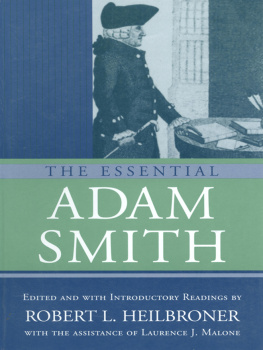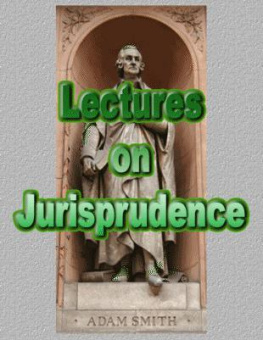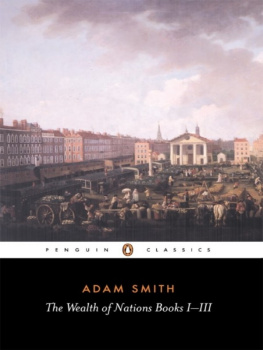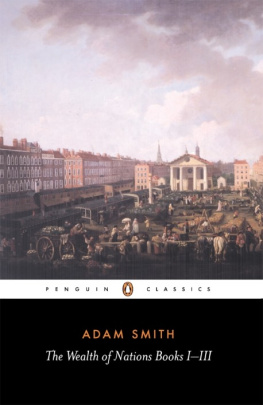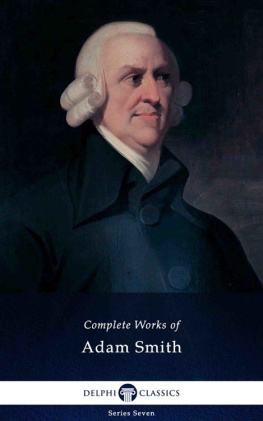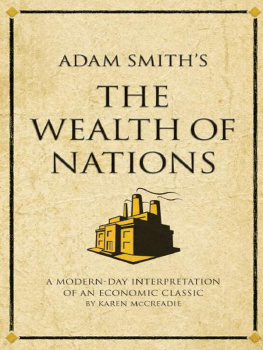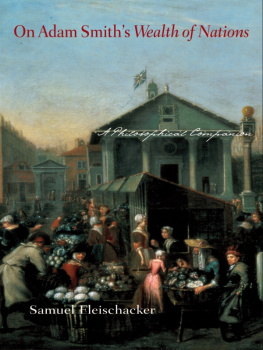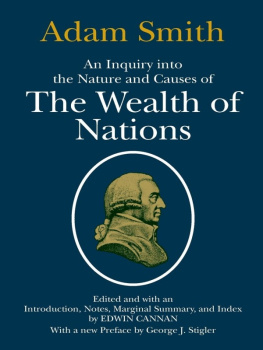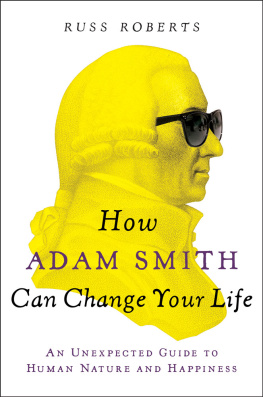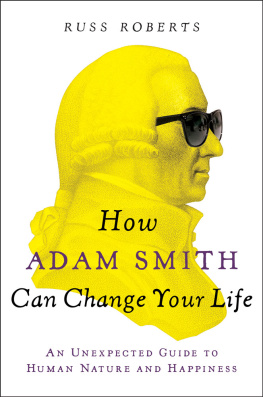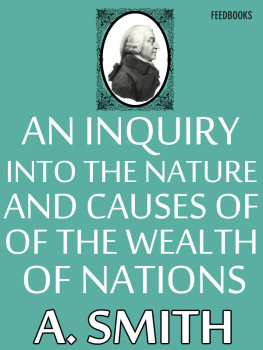Adam Smith - The Wealth of Nations: Books IV-V (Penguin Classics)
Here you can read online Adam Smith - The Wealth of Nations: Books IV-V (Penguin Classics) full text of the book (entire story) in english for free. Download pdf and epub, get meaning, cover and reviews about this ebook. year: 1999, publisher: ePenguin, genre: Science. Description of the work, (preface) as well as reviews are available. Best literature library LitArk.com created for fans of good reading and offers a wide selection of genres:
Romance novel
Science fiction
Adventure
Detective
Science
History
Home and family
Prose
Art
Politics
Computer
Non-fiction
Religion
Business
Children
Humor
Choose a favorite category and find really read worthwhile books. Enjoy immersion in the world of imagination, feel the emotions of the characters or learn something new for yourself, make an fascinating discovery.
- Book:The Wealth of Nations: Books IV-V (Penguin Classics)
- Author:
- Publisher:ePenguin
- Genre:
- Year:1999
- Rating:4 / 5
- Favourites:Add to favourites
- Your mark:
- 80
- 1
- 2
- 3
- 4
- 5
The Wealth of Nations: Books IV-V (Penguin Classics): summary, description and annotation
We offer to read an annotation, description, summary or preface (depends on what the author of the book "The Wealth of Nations: Books IV-V (Penguin Classics)" wrote himself). If you haven't found the necessary information about the book — write in the comments, we will try to find it.
The Wealth of Nations: Books IV-V (Penguin Classics) — read online for free the complete book (whole text) full work
Below is the text of the book, divided by pages. System saving the place of the last page read, allows you to conveniently read the book "The Wealth of Nations: Books IV-V (Penguin Classics)" online for free, without having to search again every time where you left off. Put a bookmark, and you can go to the page where you finished reading at any time.
Font size:
Interval:
Bookmark:

ADAM SMITH was born at Kirkcaldy, on the east coast of Scotland, in 1723. He was educated at his local school, then Glasgow University (173740), where he studied under Francis Hutcheson, and Balliol College, Oxford (174046). Two years after his return to Scotland, Smith moved to Edinburgh, where he delivered lectures on Rhetoric which did much to establish his early reputation. In 1751 he was appointed Professor of Logic at Glasgow, but was translated to Hutchesons old chair of moral philosophy in 1752. He held this appointment until 1764, during which tenure he published, in 1759, The Theory of Moral Sentiments. In 1764 Smith resigned his professorship to become tutor to the young Duke of Buccleuch. This office took him to France, where he travelled extensively and met many of the leading thinkers of the day, among them Voltaire, Quesnay, Turgot and Helvetius. Smith continued to write The Wealth of Nations in France and furthered his research after his return to Britain in 1766. The book was published in 1776, the same year as the American Declaration of Independence. In 1778 Smith was appointed as Commissioner of Customs based in Edinburgh and was a resident of the city until his death in 1790. He was elected Lord Rector of Glasgow University in 1787, succeeding his friend Edmund Burke. Smiths life was relatively uneventful, and his disposition absent-minded and retiring, yet he wrote with vigour and did not lack courage; a fact attested to by his defence of the character of the alleged atheist David Hume after the latters death.
ANDREW S. SKINNER graduated from Glasgow University in 1958. After short periods in Cornell (19589), Queens University Belfast (195962) and Queens College (now University) Dundee (19624), he returned to Glasgow University in 1964, where he now holds the post of Adam Smith Professor of Political Economy, Emeritus. Professor Skinner has written numerous articles on eighteenth-century subjects and edited Sir James Steuarts Principles of Political Economy (1966). He has also contributed to editions of Smiths Wealth of Nations (1976) and to the Essays on Philosophical Subjects (1980). He has edited (with R. H. Campbell) The Origins and Nature of the Scottish Enlightenment (1982) and (with P. Jones) Adam Smith Reviewed (1992). Professor Skinner is also the author of A System of Social Science, Papers Relating to Adam Smith (1979; 2nd edition 1996). He has re-edited Sir James Steuarts Principles of Political Economy (with Professors N. Kobayashi and H. Mizuta, 1998).
ADAM SMITH
BOOKS IVV
Edited with an introduction and notes by
ANDREW SKINNER
PENGUIN BOOKS
PENGUIN BOOKS
Published by the Penguin Group
Penguin Books Ltd, 80 Strand, London WC2R 0RL, England,
Penguin Putnam Inc., 375 Hudson Street, New York, New York 10014, USA
Penguin Books Australia Ltd, Ringwood, Victoria, Australia
Penguin Books Canada Ltd, 10 Alcorn Avenue, Toronto, Ontario, Canada M4V 3B2
Penguin Books (NZ) Ltd, Private Bag 102902, NSMC, Auckland, New Zealand
Penguin Books Ltd, Registered Offices: Harmondsworth, Middlesex, England
www.penguin.com
First published 1776
Published in Penguin Books 1999
1 3 5 7 9 10 8 6 4 2
Introduction copyright Andrew Skinner, 1999
All rights reserved
The moral right of the author has been asserted
Except in the United States of America, this book is sold subject
to the condition that it shall not, by way of trade or otherwise, be lent,
re-sold, hired out, or otherwise circulated without the publishers
prior consent in any form of binding or cover other than that in
which it is published and without a similar condition including this
condition being imposed on the subsequent purchaser
EISBN: 9781101492840
The Wealth of Nations: Books IIII, was first published in Penguin Classics in 1970. The purpose of the original introduction was to provide an account of Smiths contribution to economics, and also to place that contribution in the context of his work on ethics and jurisprudence. It was decided to complete the edition by publishing Books IV and V with an additional introduction. This material is intended to be read in conjunction with the first introduction and to look at three major themes: Adam Smiths treatment of French economists (the physiocrats); his critique of the mercantile system of regulation; and, finally, his views as to the role of the state.
The analytical contributions of the physiocrats are important in their own right, but also because Smiths knowledge of this modern macro-economic model of a capital-using system is likely to have had a significant impact on his own model, as developed in Book II of The Wealth of Nations. Smith regarded the system as essentially liberal and this led him to re-examine the mercantile system and to criticize the regulation of economic affairs. His analysis of Britains colonial relationship with America is particularly interesting. He believed that, while flawed, this relationship had nonetheless brought the mercantile system a degree of glory otherwise unobtainable. This critique is central to Smiths rejection of the mercantile system and, in particular, of the logic behind the Regulating Acts of Trade and Navigation. In my concluding analysis of Smiths views as to the appropriate functions of the state, I suggest that these are more subtle and more highly qualified than some modern interpretations would suggest.
As before, the text follows the fifth edition of 1789, which was the last published in Smiths lifetime. The original index, which was first appended to the third edition in 1783, has been retained as an important document in its own right. Spelling has been modernized in some cases, and punctuation simplified.
Andrew Skinner
PUBLICATIONS
1723 | Born Kirkcaldy, Scotland, and baptized on 5 June: the son of Adam Smith, Clerk of the Court Martial and Comptroller of Customs, and of Margaret Douglas of Strathendry. |
1731 | Entered the Burgh School, Kirkcaldy. |
17357 | George, Bishop Berkeley, The Querist. |
173740 | Attended the University of Glasgow. |
174046 | Snell Exhibitioner, Balliol College, Oxford. |
1748 | Baron de Montesquieu, De lesprit des lois. |
174851 | Delivered a course of lectures in the city of Edinburgh. |
1749 | Josiah Tucker, A Brief Essay on the Advantages and Disadvantages which respectively attend France and Great Britain with regard to Trade. |
1751 | Elected to the Chair of Logic at Glasgow University. |
1752 | Translated to the Chair of Moral Philosophy at Glasgow University. |
1754 | Franois Forbonnais, Iments du commerce. |
1755 | Richard Cantillon, Essai sur la nature du commerce en gnrale. |
1757 | Victor Riquetti, Marquis de Mirabeau, |
Font size:
Interval:
Bookmark:
Similar books «The Wealth of Nations: Books IV-V (Penguin Classics)»
Look at similar books to The Wealth of Nations: Books IV-V (Penguin Classics). We have selected literature similar in name and meaning in the hope of providing readers with more options to find new, interesting, not yet read works.
Discussion, reviews of the book The Wealth of Nations: Books IV-V (Penguin Classics) and just readers' own opinions. Leave your comments, write what you think about the work, its meaning or the main characters. Specify what exactly you liked and what you didn't like, and why you think so.


